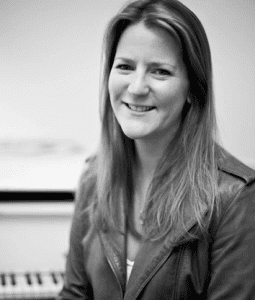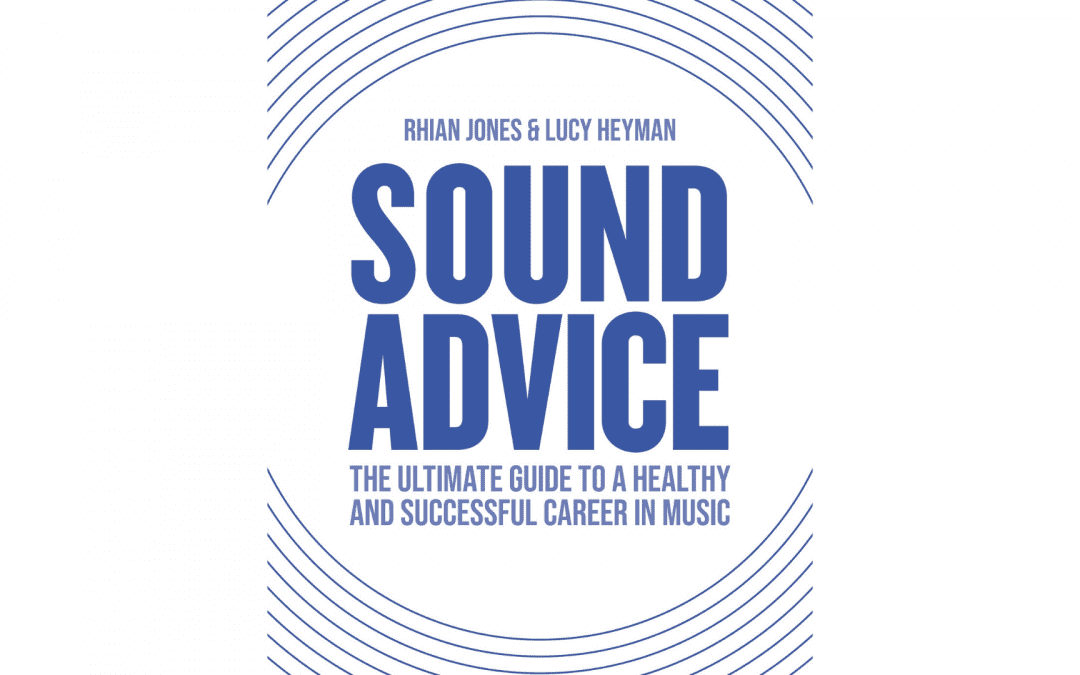Written by journalist and author Rhian Jones and vocal and performance coach & musicians’ health specialist Lucy Heyman, Sound Advice is a health-focused career guide for musicians working in the popular music industry. It features research-informed advice and information that aims to help musicians, as well as those that work with them, navigate their way through what can be a challenging and demanding industry. The book covers the mental and physical health problems science suggests musicians might come up against and offers lots of tools and techniques to help aid prevention. It’s also packed with empowering information about the structure of the industry, money management, and how to build skills as a performer, creator, and CEO of your career. With contributions from leading researchers, health experts, business execs and a host of artists including Laura Mvula, Will Young, Imogen Heap, Wayne Hector, MNEK, Nina Nesbitt, Lauren Aquilina, Ella Eyre, Jonathan Higgs, Lady Leshurr, and many more besides, Sound Advice is published 28 February and available to pre-order now. What’s more, all pre-orders are available at a discount using one of these early-bird codes: HARDCOVERPROMO (20% off), PAPERBACKPROMO (25% off) or EBOOKPROMO (15% off).
BAPAM CEO Claire Cordeaux caught up with Rhian and Lucy who spoke about giving musicians the tools they need for healthy creative practice, supporting positive change, and the need for specialist health support in the music and creative industries.
What made you want to write this book?

One of key areas that emerged was that this group of musicians really needed specialised targeted support for their health and performance psychology issues, and this backed up my professional observations from working as a vocal coach. Many had been struggling with issues for years and didn’t know where to go for advice or support. So, this was how the idea for the book came about – I wanted to create a manual that any musician could refer to where they would be able to learn about potential issues and find ways to deal with them, either by self-help approaches or for more complex problems with signposting to the very best specialist support.

That said, when I was asking those in the music industry about what support was in place to foster good health, there weren’t a lot of answers. That was baffling to me because the job of a musician can be physically and mentally demanding, on a number of different levels, and surely it’s in the music industry’s best interests to look after the people who everything is predicated on. The idea for writing a self-help style manual came to me when I was on holiday — I knew I enjoyed writing ‘how-tos’ and then married that with the subject I was most passionate about at the time. I then luckily came across Lucy who brought the experience that was needed to make sure it was respected and sound from an academic and health perspective, and we pretty much got started immediately.
I really like the structure, which combines discussions with performers with health problems and the clinicians who treat them. How did you come up with that idea?
Lucy: In the research project I conducted, it became clear that musicians really wanted peer to peer support, and they also didn’t want advice from generic specialists who didn’t understand the music industry. So, we needed to balance first-hand accounts from musicians with advice from leading experts who understood the unique challenges that working in music can bring too.
Rhian: It was also really important to us that the book was an accessible and interesting read — there’s no point including loads of useful information if the book is written in a way that isn’t engaging because readers would switch off and probably not remember what we’d written. Having lots of colourful quotes and advice from people who have real life experiences is one of the ways we did this, alongside making sure the tone wasn’t academic and the input from one of our brilliant editors, Peter Robinson, who added some hilarious lines that provided both Lucy and I with some welcome comedic relief during the editing process!
Did you find performers and music professionals needed a lot of persuasion to talk about their health experiences? I thought many of them were very courageous.
Lucy: On the whole, I was really astonished by how open and honest people were. I got the impression that for a lot of the musicians I spoke to there was a feeling of “I went through this difficult thing, and I want to share this story so that somebody else won’t have to.” And I think that’s an incredibly kind and courageous way to approach it.
Rhian: It was very difficult to get ‘big names’ to be interviewed initially but this may be more due to the fact that these people have very limited time, rather than the subject matter. That said, I do think the subject matter made some people a bit more reticent to get involved based on some of my email conversations following pitches. There is definitely still an element of shame around health issues, and mental health in particular, and some musicians don’t want that kind of narrative to become their central one, which is understandable. Those who did agree to talk to us, however, which did end up being some really known names after a lot of trial and error, were super open and passionate about the subject matter.
You cover such a broad range of topics from health and wellbeing to creativity. Was it hard to come up with a list?
Lucy: I’m currently doing a PhD on this topic, so the starting point was looking at my literature review and looking at all the topics that research suggests are issues, both for musicians generally and for those working in commercial music genres. So, there was a very clear body of evidence pointing to some key areas, such as vocal health, musculoskeletal health, performance psychology, hearing etc. It was essential that all of these topics were included. My brilliant co-author, Rhian Jones, is an experienced music business journalist, so she was keen to include perspectives and advice on the business and money-management side of things in there too, and how they impact on health. Then together we decided on a more extended list, with topics like social media, disordered eating, touring etc. But absolutely, for those extra chapters it was really hard to choose. There were also whole chapters written, which were discarded. And it was an ongoing challenge, achieving the balance of covering the most important topics, but not bombarding people with too much information.
Rhian: I remember Lucy and I coming up with a list of around 10 chapters pretty quickly at one of our early meetings about the book, which were a mix of both of our suggestions and included pretty obvious ones like physical health, vocal health, touring, business basics and mental health etc. Those 10 chapters turned into 20 as Lucy and I kept adding various ones along the way when we discovered other vital subjects or chapters that needed breaking up. I would say this process was pretty intuitive. We definitely had discussions about adding extra chapters but decided not to and I think I can speak for us both when I say we’re both really happy with what ended up being the final list. As Lucy says, with such a big subject, there’s a risk of overloading the reader with too much information so we’ve been keen to avoid that while also making sure the core issues are covered.
For me, your healthy practice messages are spot on. Did you have to do a lot of research?
Lucy: I’ve been incredibly fortunate to interview some of the leading specialists in everything from musculoskeletal health to vocal health on the Elevate Music Podcast, so that has really helped in knowing what some of the key messages are. My PhD literature review and own research projects also helped. Having said that, I was quite astonished by how quickly messages change so there was a lot of time spent checking that everything we included was right and still relevant. I seem to remember you (Claire Cordeaux) were particularly eagle-eyed and noticed in our final edit, for example, that the very latest MSK advice around soft tissue injuries had changed — we quickly updated that. So yes, there was a huge amount of research that went into the messages on top of what I already knew or had already interviewed people about. As with any kind of research-based approach, you need to be up to date with the very latest information at all times, which can be an exhausting process when you’re looking at musicians’ health across the board, but ultimately it’s absolutely essential in a project of this kind, so hopefully it was worth it!
Rhian: This is where Lucy and her expertise really helped — she made sure we were always promoting the message that fostering good health is a pretty individual experience and what works for someone, may not necessarily work for someone else. This is why any ideas for help in the book from various practitioners are suggestions, rather than the ultimate answer to everyone’s problems (we mention this in the first chapter), although the resources section is pretty universal. I was also really keen to stress the importance of learning about yourself and what you need to live a healthy and happy life — which may not be social media-approved ‘goals’ — as that’s a personal journey I’ve been on over the past few years (as I know many who are recently beyond 30 will attest to!) that’s really paid dividends, which fit in well with Lucy’s approach, too.
What kind of reception has the book had so far, and what do you hope it’s impact will be?
Lucy: We were really fortunate to have financial backing for the book early on from a number of key music industry organizations. Universal, Warner, Sony, PRS, PPL, Spotify, Vevo and others pledged financial support and trusted us to write whatever we wanted with no editorial control. So, we were really pleased with how the project connected with the industry from the start. Since then we’ve been astonished with how many of those organizations have pre-ordered books for their artists and we recently heard that the BRIT school (funded by the BRIT Trust) are going to be giving copies to their students too. In terms of impact, I really hope this book can move the conversation on about health in music from crisis management to preventative action that is easily accessible to anyone who needs it. We’re going to be giving away some funded copies of the book for free too so if anyone reading this would like a copy but doesn’t feel they can afford it, please get in touch with us at soundadvicebook@gmail.com.
Rhian: We’ve had a hugely positive reception so far. The support we’ve had for the project has been pretty mind-blowing to me and I think it speaks for the amount of will there is in the music industry to improve, or I hope so, at least. In terms of the impact, I hope lots of people read it and gain a better understanding about the health issues that may be associated with a career in music, how to deal with them if they, or someone they know/work with, experiences ill-health, and, ultimately, how to prevent health problems from happening in the first place. I’d love for readers to gain an understanding of how vital it is to look after and learn about yourself, regardless of any external pressures. And I hope anyone who might contribute to those external pressures who reads it is able to take a step back and make sure their approach to working with others is always understanding and nurturing, first and foremost.

